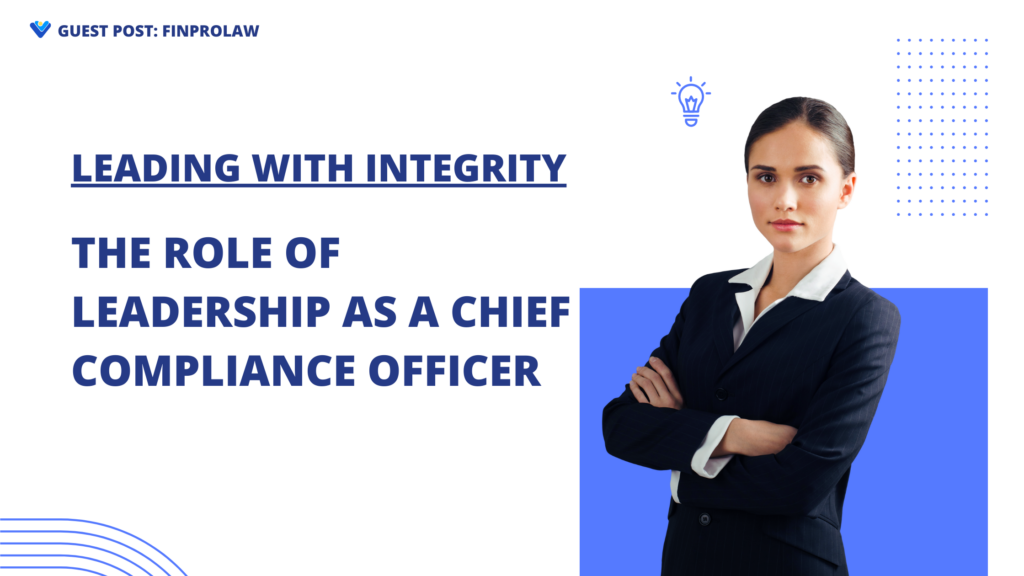Today United Atlantic Legal Services is excited to present our affiliated learning platform’s (FinProLaw) most recent post for investment adviser Chief Compliance Officers: Leading with Integrity: The Role of Leadership as a Chief Compliance Officer.

Leading with Integrity: The Role of Leadership as a Chief Compliance Officer
In today’s increasingly regulated investment adviser landscape, compliance has become a critical aspect of organizational success. As every good Chief Compliance Officer knows, compliance ensures adherence to laws, regulations, and ethical standards, safeguarding the reputation and sustainability of businesses. However, compliance is not solely a responsibility of the legal or compliance department—it requires strong leadership from the top. In this edition of What a CCO Ought to Know, FinProLaw will explore the significance of leadership in compliance and how it sets the tone for a culture of integrity and ethical behavior within organizations.
Setting the Example
The investment adviser Chief Compliance Officer is a leader! Leadership plays a pivotal role in shaping the compliance culture within an organization. Leaders who prioritize and demonstrate a commitment to compliance set an example for employees to follow. By exhibiting ethical behavior, adhering to regulations, and embracing transparency, leaders create a foundation of trust and integrity that permeates throughout the organization. Employees observe and emulate the behavior of their leaders, and when they witness a strong compliance ethos at the top, they are more likely to prioritize compliance in their own roles.
Establishing Clear Expectations
Effective Chief Compliance Officers understand the importance of communicating clear expectations regarding compliance. They articulate the organization’s commitment to compliance, ethical conduct, and the consequences of non-compliance. By establishing a comprehensive code of conduct (your required code of ethics) and robust policies, leaders provide employees with a framework for decision-making and guide them in understanding what is expected of them in terms of compliance. Clear expectations ensure that employees have a solid understanding of their compliance responsibilities and create a basis for fostering a compliance-focused environment.
Embedding Compliance in Organizational Processes
Leadership must go beyond mere rhetoric and actively integrate compliance into the investment adviser’s processes and systems. Effective leaders ensure that compliance considerations are woven into the fabric of business operations, risk management, and decision-making frameworks. By embedding compliance into key processes such as hiring, training, performance evaluations, and rewards systems, leaders reinforce the importance of compliance at every level of the organization. This integration helps prevent compliance from being perceived as an afterthought but rather as an integral part of day-to-day business activities.
Providing Resources and Support
Leadership plays a crucial role in providing the necessary resources, training, and support for employees to fulfill their compliance obligations effectively. They allocate sufficient budget, technology, and personnel to support compliance efforts. Additionally, leaders promote ongoing compliance education and training initiatives to keep employees updated on changing regulations and ethical practices. By investing in compliance resources, leaders empower employees to make informed decisions, mitigate risks, and act in accordance with the organization’s compliance objectives. Chief Compliance Officers at investment adviser firms will understand just how scrutinized their department’s budget is: be and advocate and make sure the firm understand what you and your department does, why it’s important and how it helps protect the firm.
Promoting Reporting and Accountability
Chief Compliance Officers must encourage and foster a culture of reporting and accountability within the organization. This involves creating channels for employees to report compliance concerns confidentially and without fear of retaliation. Leaders must ensure that robust mechanisms are in place to investigate reported concerns promptly and take appropriate action. By promoting transparency and accountability, leaders empower employees to speak up and identify potential compliance issues, which ultimately helps prevent larger problems from arising.
I have learned that transparency makes it very hard for people to hide when projects, deadlines or goals are not being met. If everyone has been communicating and transparent about obstacles, then there are usually very few excuses for failure.
Continuous Monitoring and Improvement
Leadership in compliance requires a commitment to continuous monitoring, evaluation, and improvement. Chief Compliance Officers cannot stagnate or rest on their laurels. Effective leaders regularly assess the effectiveness of compliance programs, identify gaps, and implement necessary enhancements. By embracing a culture of continuous improvement, leaders demonstrate their dedication to staying ahead of evolving regulations and ethical standards. Regular audits, risk assessments, and external compliance reviews enable leaders to proactively identify and address compliance vulnerabilities, further strengthening the organization’s compliance posture.
What a CCO Ought to Know…
Leadership is a critical driver in fostering a culture of compliance within organizations. By setting the example, establishing clear expectations, embedding compliance in processes, providing resources and support, promoting reporting and accountability, and continuously monitoring and improving, leaders create an environment where compliance is valued and ingrained in the organization’s DNA. Effective leadership in compliance not only safeguards the organization’s reputation but also enables sustainable growth, enhances stakeholder trust, and ensures ethical practices that benefit both the organization and your compliance department.
About the Author

Michael Rasmussen is the founder of United Atlantic Legal Services. He is a licensed attorney in Florida and registered solicitor in the United Kingdom. Michael has acted as General Counsel and Chief Compliance Officer to several investment advisers, including private fund managers, responsible for the management of billions of dollars in client assets.
Michael is also the founder of FinProLaw, an online learning platform where Michael has created courses designed for investment adviser compliance professionals. These courses include:
Michael can also be found on LinkedIn.
Investment adviser firms who are also clients of United Atlantic Legal Services can receive many of these courses at a significantly reduced fee or, in some cases, at no expense. Contact us today or visit the FinProLaw to learn more.